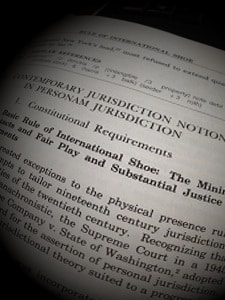
Following the Illinois ban, the Department canceled Wolfe’s Georgia driver’s license under OCGA § 40-5-50, claiming that the withdrawal of Wolfe’s driving privileges in Illinois renders him ineligible for the issuance of a driver’s license in Georgia. Wolfe in his sole enumeration of error alleged that the Georgia Department of Driver’s Services did not have the authority to cancel his license. The Court of Appeals held that because Wolfe availed himself of the privilege of driving on the roadways of the State of Illinois on at least two occasions in the 1980’s he thereby subjected himself to the rules and regulations regarding the licensing and privilege of driving in Illinois including statutes enacted after the fact.
Setting aside the retroactively applied driving privilege ban, how can Illinois impose a lifetime ban of driving privileges on someone who never had an Illinois license, never lived in Illinois, and had no contacts of record whatsoever with the State after his two DUIs in the 1980s, and the triggering DUI occurred in another state while licensed in that state? Isn’t there some sort of minimum contacts/due process Burger King v. Rudzewicz, 471 U.S.462 (1985) analysis that needs to be applied here? Individuals are entitled to have “fair warning that a particular activity may subject [them] to the jurisdiction of a foreign sovereign,” Shaffer v. Heitner, 433 U.S. 186, 218 (1977) (STEVENS, J., concurring in judgment), the Due Process Clause “gives a degree of predictability to the legal system that allows potential defendants to structure their primary conduct with some minimum assurance as to where that conduct will and will not render them liable to suit [or criminal or quasi-criminal punishment],” Burger King, supra at 472. See also, U.S. v. Bowman, 260 U.S. 94 (1922)(holding that presumption against extraterritoriality applies to criminal statutes that are logically dependent on their locality for the government’s jurisdiction.)
Further, this retroactive application of Illinois law passed in 1999 for DUI occurring in 1987 and 1989 violates Georgia law. “Where a statute governs the only procedure of the courts, including the rules of evidence, it is to be given retroactive effect absent an expressed contrary intention,” otherwise where the law affects substantive rights it can only be applied prospectively. State v. Levins, 234 Ga. App. 739, 507 S.E.2d 246 (1998) citing Holsey v. State, 199 Ga.App. 782, 783(3), 406 S.E.2d 127 (1991). “Substantive law is that law which creates rights, duties, and obligations. Procedural law is that law that prescribes the methods of enforcement of rights, duties, and obligations. [Cits.]” Id citing Polito v. Holland, 258 Ga. 54, 55(3), 365 S.E.2d 273 (1988).
-Author: George Creal

